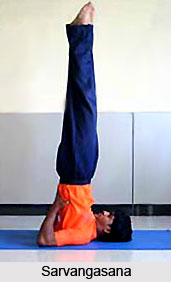 Treatment of indigestion is required when one faces digestion trouble of difficulty in eating all kinds of foods. Some people can eat anything and they never get upset stomachs, but there are some people who are more sensitive to food and they might find certain ones just do not digest in their systems. The best precaution to avoid Indigestion is to avoid spicy foods that are often termed as problem foods. It is preferable to eat several smaller meals instead of heavy ones at a time.
Treatment of indigestion is required when one faces digestion trouble of difficulty in eating all kinds of foods. Some people can eat anything and they never get upset stomachs, but there are some people who are more sensitive to food and they might find certain ones just do not digest in their systems. The best precaution to avoid Indigestion is to avoid spicy foods that are often termed as problem foods. It is preferable to eat several smaller meals instead of heavy ones at a time.
One should avoid fatty, greasy foods, like fries and burgers as much as possible and also too much chocolate. Eating slowly prevents indigestion. Smoking and excessive stress increases the risks of indigestion. One should give his body a chance to digest food. After eating a huge meal and immediately going for a sports practice also invites indigestion. One should try to eat at least an hour beforehand, or eat later. One might do all these things, but still get indigestion once in a while. Consuming coffee, carbonated beverages, and alcohol also increases the risks of indigestion. Using medications that may irritate the stomach lining, such as aspirin or anti-inflammatory drugs, are also the cause of indigestion.
The doctor may first recommend over-the-counter antacids or medications that reduce acid production or help the stomach move food more quickly into the small intestine. Many of these medications can be purchased without a prescription. Nonprescription medications should only be used at the dose and for the length of time recommended on the label unless advised separately by a doctor. Informing the doctor when starting a new medication is very important.
Antacids, such as Alka-Seltzer, Maalox, Rolaids, Mylanta, and Riopan, are usually the first drugs recommended for the treatment of indigestion. Many brands on the market use different combinations of three basic salts like magnesium, calcium, and aluminum with hydroxide or bicarbonate ions to neutralize the acid in the stomach. Antacids, however, can have side effects. Magnesium salt can lead to diarrhea, and aluminum salt may cause constipation. Aluminum and magnesium salts are often combined in a single product to balance these effects. Calcium carbonate antacids, such as Tums, Titralac, and Alka-2, can also be a supplemental source of calcium, however, they may cause constipation.
H2 receptor antagonists (H2RAs) include ranitidine (Zantac), cimetidine (Tagamet), famotidine (Pepcid), and nizatidine (Axid) that are available both by prescription and over-the-counter. H2RAs treat symptoms of indigestion by reducing stomach acid. They work for longer durations than but not as quickly as antacids. Side effects of H2RAs may include headache, vomiting, nausea, diarrhea, constipation, and unusual bleeding or bruising.
 Proton pump inhibitors (PPIs) include omeprazole (Prilosec, Zegerid), pantoprazole (Protonix), lansoprazole (Prevacid), rabeprazole (Aciphex), and esomeprazole (Nexium) and are available by the doctor`s prescription. Prilosec is also available in over-the-counter strength. PPIs, which are stronger than H2RAs, also treat indigestion symptoms by reducing stomach acid. PPIs are most effective in treating symptoms of indigestion in people who also suffer from GERD. Side effects of PPIs may include back pain, aching, nausea, cough, headache, abdominal pain, vomiting, dizziness, gas, constipation, and diarrhea.
Proton pump inhibitors (PPIs) include omeprazole (Prilosec, Zegerid), pantoprazole (Protonix), lansoprazole (Prevacid), rabeprazole (Aciphex), and esomeprazole (Nexium) and are available by the doctor`s prescription. Prilosec is also available in over-the-counter strength. PPIs, which are stronger than H2RAs, also treat indigestion symptoms by reducing stomach acid. PPIs are most effective in treating symptoms of indigestion in people who also suffer from GERD. Side effects of PPIs may include back pain, aching, nausea, cough, headache, abdominal pain, vomiting, dizziness, gas, constipation, and diarrhea.
Prokinetics such as metoclopramide (Reglan) may be effectual for people who have a problem with the stomach emptying too slowly. Metoclopramide also improves muscle movement in the digestive tract. Prokinetics have frequent side effects that limit their usefulness, including fatigue, depression, sleepiness, anxiety, and involuntary muscle spasms or movements. If the medical tests show the type of bacteria that causes peptic ulcer disease, the doctor may prescribe antibiotics to treat the condition.
Sometimes a person has indigestion for which a cause cannot be found. This type of indigestion is called functional dyspepsia. However, indigestion and heartburn are different conditions, but a person can have symptoms of both. The treatment in this case should be strictly done under a capable doctor. The doctor may ask for reports of X-rays, blood, breath, and stool tests and an upper endoscopy with biopsies to diagnose indigestion. Some people may easily experience relief from indigestion by making some lifestyle changes and decreasing stress. The priomary medication of a doctor may include antacids, H2 receptor antagonists (H2RAs), proton pump inhibitors (PPIs), prokinetics, or antibiotics to treat the symptoms of indigestion.
Naturopathy is very effective in case of treatment of indigestion. Mixing one teaspoon cumin seeds (zeera) and a pinch of salt in a glass of water and taking it twice a day can help reduce this problem. Ajwain is also a good remedy for indigestion. Taking it one or two teaspoon with a pinch of rock salt gives best result. Taking half a teaspoon of aniseed daily improves digestion system. Coriander juice is also beneficial for indigestion. Digestion system can be improved by taking lemon juice mixed with warm water twice a day. Taking a tablespoon of cinnamon water after meal, makes digestion smooth. Taking one papaya fruit in the breakfast betters the digestion system and keeps anyone fresh and energetic. Fresh juice of curry leaves with limejuice and sugar is very effective for indigestion.
Moreover, regular exercise keeps the body in shape, keeps weight under control, and also prevents indigestion. Plenty of water, simple and light foods, green and fibrous vegetables, low fat, and less oily foods are some of the very important ingredients in diet to heal indigestion. One should always wear comfortable and good fabric cloth. Practicing meditation and yoga keeps a good balance between work and rest. Most asana like sarvangasana, trikonasana, and various breathing exercises are very effective and can cure indigestion from root. Asana improves digestion problem, improves blood circulation, gives inner strength, and keep us physically and mentally sound. Yoga is beneficial for indigestion. The simple practice of alternate breathing exercise, ujjaii and bashtrika pranayama should be done everyday for healthy living.
Treatment of indigestion is not much complex but negligence can lead to serious health problems. Indigestion can be prevented at its base by altering lifestyle and food habits. However, eating light food can start primary stages of treatment at home. If the trouble persists, the doctor shall prescribe the suitable antacid or other medicines for the patient.




















